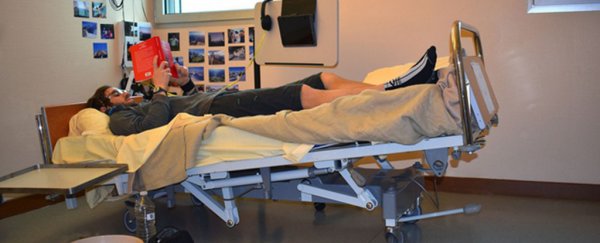There's no doubt about it – spaceflight is brutal on the human body.
Studying the effects of microgravity on our biology isn't helped by the expense of launching people into orbit, so scientists have come up with a relatively low-cost solution: pay somebody to lay on their back for two months.
Researchers at the Institute for Space Medicine and Physiology in France are on the lookout for 24 fit, healthy males who don't smoke and are between the ages of 20 and 45 to take on the laziest job in the Universe.
In exchange for €16,000 (~US$17,000), the subjects will spend two weeks undergoing various tests before being completely bedridden for 60 days, followed by a further fortnight of evaluation.
Sound tempting? That means all activity, from eating to bathroom matters, would be performed lying in bed, with the upper half of the body tilting down at a slight -6 degree angle.
That's not to say there's no wiggle room involved.
"The rule of the game is to keep at least one shoulder in contact with the bed or stretcher," the project's coordinating physician Arnaud Beck told French news program 20 minutes.
The experiment, given the name "Cocktail", aims to replicate the weightless conditions astronauts on the International Space Station experience and try to compensate for them using a 'cocktail' of supplements, without actually putting them in space.
Humans evolved to make good use of gravity's downward force – not only is blood pulled down from our head, the squeezing of our muscles against our blood vessels as we walk and hold ourselves upright also helps our circulation.
In the short term, time spent floating about in free-fall can make astronauts experience dizziness as a result of the lower blood pressure and slow decrease in blood volume, something the paid volunteers will also have to cope with.
"Under these specific conditions, the cardiovascular system is impacted, it is no longer able to provide the same effort as before departure or before bed rest," said Beck.
As the weeks and months pass, muscles also deteriorate up the back and in the bottom half of the body, bone density decreases, and immune defences are lowered.
In an effort to combat these effects, the researchers are testing a mix of antioxidants and anti-inflammatories in the form of capsules the volunteers take with their food.
"Half of them do not take anything and the other half take a cocktail of capsules, hence the name of the study, supposed to counteract the repercussions of weightlessness," said Beck.
The experiment is hardly a new frontier for these researchers, with 12 others having already undertaken the horizontal challenge in a first round of testing at the institute.
NASA also uses prolonged bedrest to simulate microgravity as part of its :envihab analog missions studies.
One volunteer was paid US$18,000 to lie in bed for three months in 2014, spending his time playing computer games, being reflective, and then just being plain bored.
"I was fighting to remain standing from the start, and it only became more difficult," research subject Andrew Iwanicki reported in Vice, describing the moment he was finally permitted to walk again.
Doing nothing for a couple of months isn't for those who need constant mental or physical stimulation, but if it's your sort of thing and you feel you could use a break in Toulouse, why not apply online?
It's just one small rest for a man, after all, but one giant sleep for mankind.
